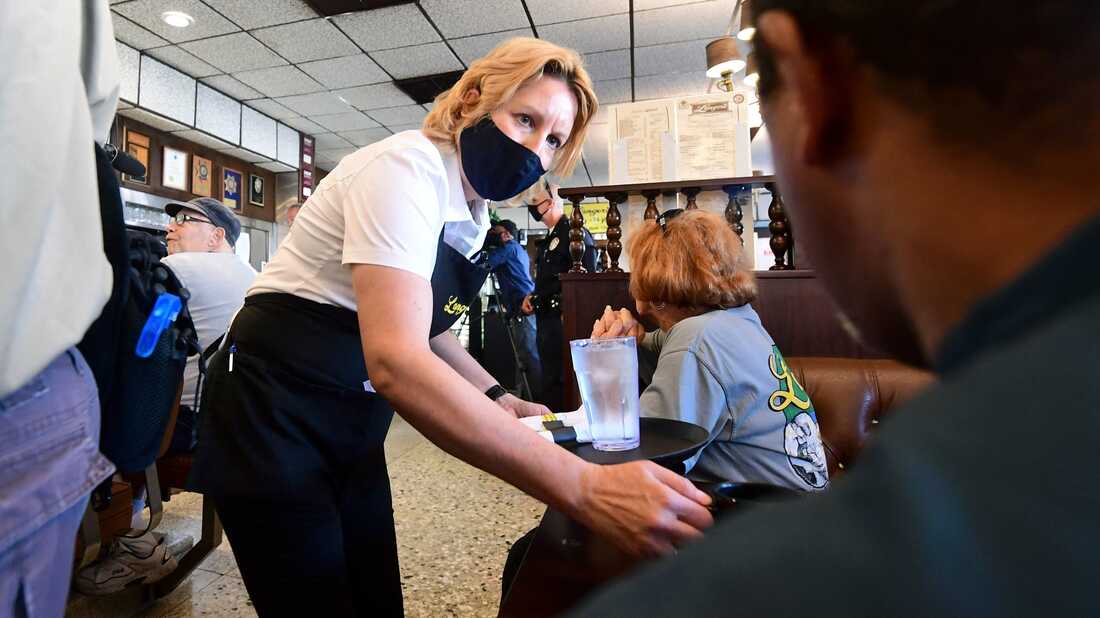Marist Poll Content Uploads 2019 Npr Pbs Newshour Marist Poll Usa Nos Tables 1907190926

A waitress wears a confront mask while serving at Langer's Delicatessen-Restaurant in Los Angeles on June 15. Frederic J. Dark-brown/AFP via Getty Images hide caption
toggle explanation
Frederic J. Chocolate-brown/AFP via Getty Images

A waitress wears a confront mask while serving at Langer'due south Delicatessen-Eating place in Los Angeles on June 15.
Frederic J. Brownish/AFP via Getty Images
Normal is not easily defined.
The past fifteen months, though, have certainly been anything but.
Americans are starting to believe a "sense of normal" is approaching adequately soon, yet, co-ordinate to a new NPR/PBS NewsHour/Marist survey. The poll too plant that with the coronavirus receding in this country, mask-wearing is declining and Americans are going out more. Merely they remain cautious about being in big crowds.
As the state continues to open up up, more than focus turns to the economy, which cratered during the beginning of the pandemic concluding twelvemonth. And Americans are split by race, gender and politics on whether President Biden's ambitious policies are helping or not.
Race, gender and party divides on Biden and the economic system
Iii months ago, in a similar survey, 49% of adults said the president'southward policies were strengthening the economy, while 44% said they were weakening information technology.
Now, that's declined a net of vi points, as 44% of respondents in the new poll say Biden's policies have strengthened the economy and 45% say the contrary. The percent who were unsure also jumped 4 points. It's all a little bit of a warning sign for Biden as he pushes for ii large — and expensive — spending packages.
There are significant splits past race and gender:
- Simply 39% of whites said Biden'due south policies have strengthened the economy, but 52% of people of color say they have.
- 54% of contained men say his policies have weakened the economy, while 56% of independent women say they've strengthened it.
- 45% of white male college graduates say Biden has strengthened the economy, but a significantly college 64% of white women with college degrees said so.
Inflation vs. wages by party
A quarter of Americans rank inflation as the U.Southward. economic system'due south top business. That's followed by wages, unemployment, housing costs, labor shortages, gas prices and involvement rates.
But there's a sharp political divide on the question. Republicans and independents rank inflation as their top concern, while for Democrats, information technology was wages. Simply four% of Republicans said wages were their top concern.
Loading...
Return to "normal"
Americans are growing increasingly optimistic about when life will return to a "sense of normal," as the survey labels it.
In April, three-quarters of Americans said they believe it volition take six months or more than. At present, it's just half. About a quarter (27%) say it will be less than six months, up from fifteen% two months ago.
People are also growing more than comfortable doing certain things, proverb they're:
- dining out at restaurants (78%) and
- visiting unvaccinated friends and family (75%).
But they are not as comfortable doing others:
- almost 7 in x are non going out to bars;
- nearly ii-thirds are not attending live concerts or sporting events (65%);
- and a bulk take too non resumed going to in-person religious services (54%).
COVID-nineteen vaccines and going back to work
While half say they are concerned about some other coronavirus surge, virtually nine in 10 U.Southward. adults with jobs say they are at least somewhat comfy returning to work.
Notably, a majority (57%) of those with jobs do non believe employers should crave COVID-19 vaccines equally a condition to return to in-person work.
More than a quarter of Americans say they will not get vaccinated. The virtually resistant to getting vaccinated keep to be supporters of former President Donald Trump. Half of them say they won't get the shot, the highest of any grouping surveyed. Trump has touted the vaccine and got it himself.
Since Centers for Disease Control and Prevention guidelines came out, noting that Americans who have been vaccinated tin largely set masks aside, in that location's been a double-digit decline in those saying they vesture a mask even when information technology'south not required.
In that location's also been a double-digit increment in those saying they by and large do not wear a mask. In May, 49% said they wore masks fifty-fifty when it was not required. Now, that'south just 36%.
1 in five said they by and large do not clothing masks. Ii months ago, it was less than 1 in 10.
Affordability, non the coronavirus, is limiting vacations
Speaking of getting back to normal, a majority of Americans say they program to accept a vacation this summertime.
Only of the meaning minority (45%) who say they aren't taking i, virtually iii times as many cited affordability (35%) as the principal reason for not going, every bit opposed to concerns well-nigh COVID-xix (12%).
Methodology: The poll of 1,115 U.Southward. adults was conducted using alive phone interviewers from June 22-29. Survey questions were bachelor in English language or Spanish. The full sample has a margin of error of plus or minus 3.vii per centum points with larger margins of error for smaller group subsets.
Source: https://www.npr.org/2021/07/01/1012025092/5-findings-from-a-new-npr-pbs-newshour-marist-poll-on-covid-19-and-the-economy